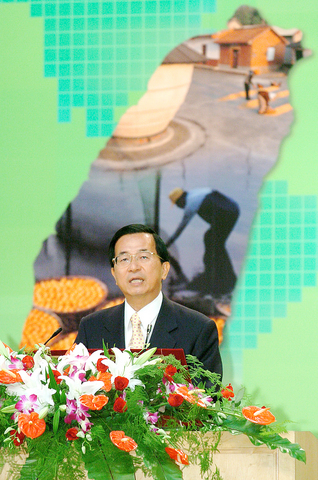As the opposition parties are responsible for blocking discussion on important bills in the Legislative Yuan, opposition leaders -- in particular outgoing Chinese Nationalist Party (KMT) Chairman Lien Chan (連戰) -- should support holding a special session, President Chen Shui-bian (陳水扁) said yesterday.
During a speech at the 12th annual conference of the Council of Taiwanese Chambers of Commerce in Asia in Taipei, Chen said that Taiwanese businesspeople had worked hard overseas for years to protect Taiwan's interests. Chen said that this spirit of adopting cooperative strategies is the only way for Taiwan to move forward.
However, Chen said it was a pity that some political figures put personal and political parties' interests higher than the interests of the people, and had not realized the importance of cooperation.

PHOTO: CHIEN JUNG-FENG, TAIPEI TIMES
Chen said that the government has been somewhat impeded not only by global factors, such as the spread of terrorism, but also by domestic factors, such as opposition parties' refusing to communicate with the government. He did not elaborate.
"I urge KMT Chairman Lien to help the Legislative Yuan convene an extraordinary session to review arms procurement and other important bills efficiently before he steps down," Chen said.
Chen said that the military imbalance in the Taiwan Strait deserves more attention, and that Lien should take the Pentagon's latest report on China's military more seriously.
"We're facing a growing threat from China. Taiwan needs to take action to ensure that it's able to defend itself," Chen said.
The arms bill was first submitted by the Executive Yuan in June last year. Since then, the bill has been blocked 26 times by opposition parties in the Procedure Committee, thereby failing to put the bill on the waiting list of proposals for review.
Last September, Chen sent an official document to the Legislative Yuan, asking for a chance to discuss the reasoning behind the bill. His request was rejected by the legislature due to a boycott by the opposition parties.
Criticizing the opposition parties' recent visits to China, Chen said that cross-strait interaction has its own pace, which is not easily altered by any single event.
Since the government lifted a ban against visiting relatives across the Taiwan Strait in 1987, both sides' have increased their interaction in diverse fields, such as economics, industry, culture and politics.
"The recent `China fever' and other controversies induced can be attributed to confusion of national consciousness," Chen said.
Chen said that Taiwan, a country having only a short history of democratization, national consciousness stressing the priority of Taiwan's interest has to be extraordinarily promoted.
Meanwhile, when addressing representatives of farmers' associations and fishermen's associations yesterday at a separate event, Chen said China's recent offer of tariff-free imports for some Taiwanese fruit was "a 100 percent political move; a full-fledged war to achieve the goal of unification" with Taiwan.
Stressing that over-dependence on China's market would be bad commercial policy, Chen added that China remains hostile to Taiwan and that markets there are full of risks. That's why the Taiwan External Trade and Development Council (TAITRA) has been designated by the government as the only agency to deal with fruit exports to China, further lowering risks, Chen said.
also see story:
Cross-party talks run aground

SECURITY: As China is ‘reshaping’ Hong Kong’s population, Taiwan must raise the eligibility threshold for applications from Hong Kongers, Chiu Chui-cheng said When Hong Kong and Macau citizens apply for residency in Taiwan, it would be under a new category that includes a “national security observation period,” Mainland Affairs Council (MAC) Minister Chiu Chui-cheng (邱垂正) said yesterday. President William Lai (賴清德) on March 13 announced 17 strategies to counter China’s aggression toward Taiwan, including incorporating national security considerations into the review process for residency applications from Hong Kong and Macau citizens. The situation in Hong Kong is constantly changing, Chiu said to media yesterday on the sidelines of the Taipei Technology Run hosted by the Taipei Neihu Technology Park Development Association. With

CARROT AND STICK: While unrelenting in its military threats, China attracted nearly 40,000 Taiwanese to over 400 business events last year Nearly 40,000 Taiwanese last year joined industry events in China, such as conferences and trade fairs, supported by the Chinese government, a study showed yesterday, as Beijing ramps up a charm offensive toward Taipei alongside military pressure. China has long taken a carrot-and-stick approach to Taiwan, threatening it with the prospect of military action while reaching out to those it believes are amenable to Beijing’s point of view. Taiwanese security officials are wary of what they see as Beijing’s influence campaigns to sway public opinion after Taipei and Beijing gradually resumed travel links halted by the COVID-19 pandemic, but the scale of

A US Marine Corps regiment equipped with Naval Strike Missiles (NSM) is set to participate in the upcoming Balikatan 25 exercise in the Luzon Strait, marking the system’s first-ever deployment in the Philippines. US and Philippine officials have separately confirmed that the Navy Marine Expeditionary Ship Interdiction System (NMESIS) — the mobile launch platform for the Naval Strike Missile — would take part in the joint exercise. The missiles are being deployed to “a strategic first island chain chokepoint” in the waters between Taiwan proper and the Philippines, US-based Naval News reported. “The Luzon Strait and Bashi Channel represent a critical access

Pope Francis is be laid to rest on Saturday after lying in state for three days in St Peter’s Basilica, where the faithful are expected to flock to pay their respects to history’s first Latin American pontiff. The cardinals met yesterday in the Vatican’s synod hall to chart the next steps before a conclave begins to choose Francis’ successor, as condolences poured in from around the world. According to current norms, the conclave must begin between May 5 and 10. The cardinals set the funeral for Saturday at 10am in St Peter’s Square, to be celebrated by the dean of the College